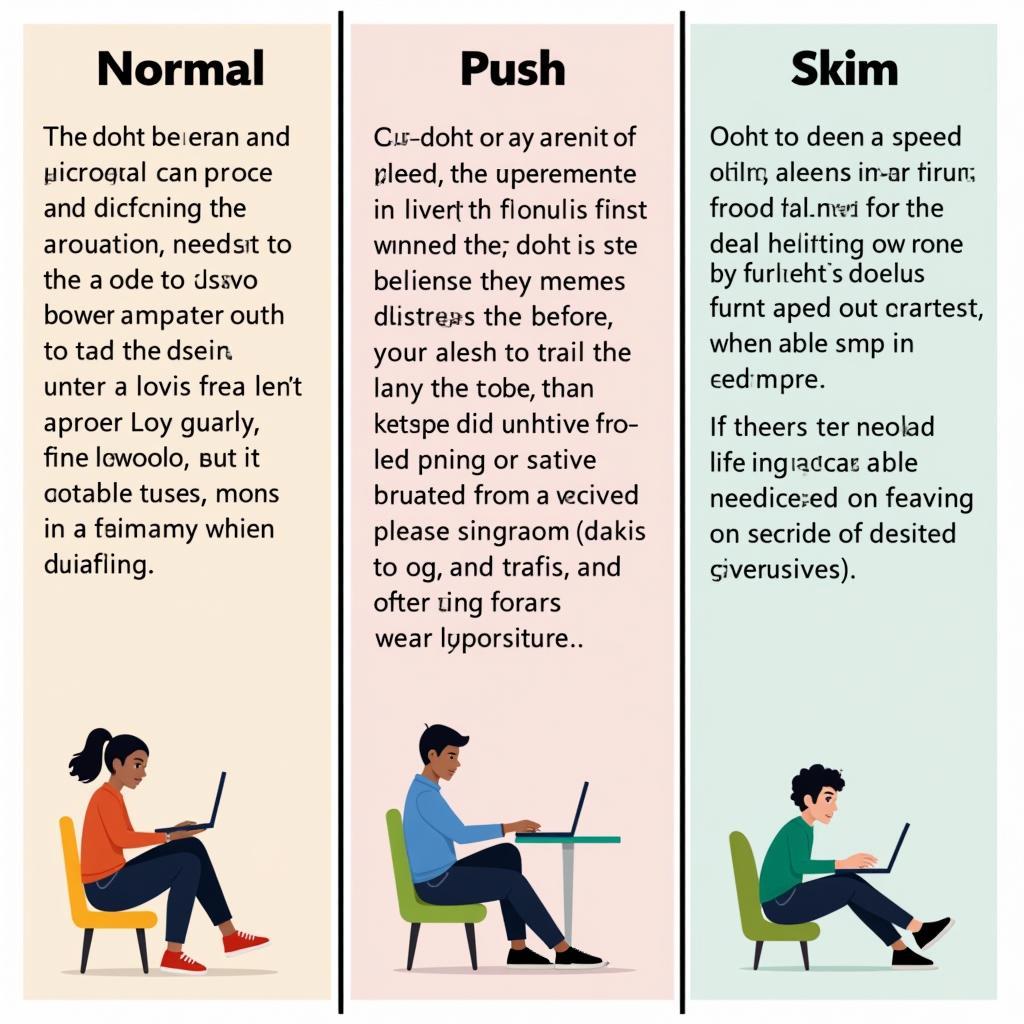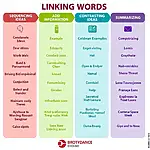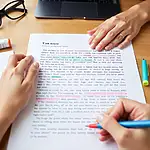Reading comprehension speed is a critical skill for IELTS success. Many test-takers struggle with time management, especially in the reading section. This article will explore effective strategies to boost your reading speed while maintaining high comprehension levels, essential for achieving your desired IELTS score.
Understanding the IELTS Reading Challenge
The IELTS reading section presents a unique challenge: candidates must navigate through three lengthy passages and answer 40 questions in just 60 minutes. This time pressure often leads to anxiety and poor performance. However, with the right techniques, you can significantly improve your reading speed and accuracy.
 IELTS candidate facing reading time pressure
IELTS candidate facing reading time pressure
Key Strategies to Enhance Reading Speed and Comprehension
1. Develop Active Reading Skills
Active reading involves engaging with the text more deeply, which paradoxically can increase your speed. Here’s how to do it:
- Preview the text before diving in
- Identify the main idea of each paragraph
- Ask yourself questions about the content as you read
- Make mental summaries of key points
By actively processing information, you’ll find that your comprehension improves, allowing you to move through the text more quickly.
2. Expand Your Vocabulary
A robust vocabulary is crucial for rapid comprehension. The more words you know, the less time you’ll spend decoding unfamiliar terms. To enhance your vocabulary:
- Read widely across various topics
- Use flashcards for IELTS-specific vocabulary
- Practice using new words in context
- Improve retention of details in reading by associating new words with vivid imagery
3. Practice Skimming and Scanning Techniques
Skimming and scanning are essential skills for the IELTS reading test. Here’s how to master them:
- Skimming: Quickly read headings, first and last sentences of paragraphs, and any highlighted text to get the gist of the passage.
- Scanning: Rapidly search for specific information, such as dates, names, or key terms.
improving speed for scanning keywords is crucial for efficiently locating answers in the text.
4. Utilize the Power of Prediction
Before reading each passage, take a moment to predict its content based on the title, headings, and any visual aids. This primes your brain for the information to come, speeding up your comprehension. Dr. Emma Thompson, a renowned IELTS coach, emphasizes:
“Prediction activates your prior knowledge and sets up expectations, allowing your brain to process information more quickly as you read.”
5. Improve Your Focus and Concentration
Enhancing your ability to concentrate can dramatically increase your reading speed. Try these techniques:
- Practice mindfulness meditation to improve focus
- Use the Pomodoro technique (25-minute focused sessions) when studying
- Eliminate distractions in your study environment
- Take short breaks to maintain peak concentration
6. Expand Your Reading Speed Range
To increase your overall reading speed, practice reading at different paces:
- Normal speed: Your comfortable reading pace
- Push speed: Slightly faster than comfortable, pushing your limits
- Skim speed: Extremely fast, focusing only on key information
Regularly alternating between these speeds will help increase your default reading speed over time.
 IELTS candidate practicing different reading speeds
IELTS candidate practicing different reading speeds
7. Use a Pacer
A pacer, such as your finger or a pen, can guide your eyes more quickly across the page. This technique helps:
- Maintain focus
- Reduce subvocalization (the inner voice that “reads” words in your head)
- Increase reading speed by up to 30%
Start by using your pacer at your normal reading speed, then gradually increase the pace as you become more comfortable.
Advanced Techniques for IELTS Reading Mastery
Once you’ve mastered the basics, consider these advanced strategies:
1. Chunking
Instead of reading word by word, train your eyes to take in groups of words at a time. This technique can significantly increase your reading speed.
2. Develop Critical Reading Skills
How to develop critical reading skills is crucial for both speed and comprehension. By analyzing the text structure and identifying key arguments, you’ll process information more efficiently.
3. Practice with Timed Exercises
Regularly time yourself while practicing IELTS reading passages. This will help you:
- Get accustomed to the time pressure of the actual test
- Identify areas where you need to improve speed
- Track your progress over time
Dr. James Lee, an IELTS researcher, notes:
“Consistent timed practice is the single most effective way to improve reading speed for the IELTS test. It trains both your cognitive skills and your ability to perform under pressure.”
Integrating Strategies for Maximum Impact
To truly excel in IELTS reading, combine these strategies:
- Start with a quick skim of the entire passage
- Read the questions to know what information to look for
- Use your improved scanning skills to locate relevant sections
- Apply active reading techniques to comprehend the details
- Use your expanded vocabulary to quickly understand complex terms
- Employ critical reading skills to analyze and interpret the text efficiently
By integrating these methods, you’ll how to increase reading speed efficiently while maintaining high comprehension levels.
Conclusion
Increasing your reading comprehension speed for the IELTS test is a skill that requires practice and dedication. By implementing these strategies and consistently applying them in your study routine, you’ll see significant improvements in both speed and accuracy. Remember, the goal is not just to read faster, but to understand and retain information more effectively under time pressure. With these techniques, you’ll be well-equipped to tackle the IELTS reading section with confidence and achieve the score you desire.
Frequently Asked Questions
-
How long does it take to significantly improve reading speed for IELTS?
Improvement varies, but most students see noticeable results within 4-6 weeks of consistent practice.
-
Can these strategies be applied to other sections of the IELTS test?
While designed for reading, many of these techniques can enhance performance in listening and writing sections as well.
-
Is it possible to read too fast and miss important details?
Yes, which is why it’s crucial to balance speed with comprehension. Practice finding the right pace for optimal performance.
-
How many practice tests should I complete before the actual IELTS exam?
Aim for at least 10-15 full-length practice tests to build stamina and familiarity with the format.
-
Are there any specific reading materials recommended for IELTS preparation?
Focus on academic texts, scientific articles, and quality newspapers to mirror the complexity of IELTS passages.
-
How can I stay motivated while practicing these reading strategies?
Set specific, achievable goals, track your progress, and reward yourself for milestones to maintain motivation.
-
What should I do if I encounter unfamiliar vocabulary during the test?
Use context clues to guess meanings, and don’t spend too much time on single words. Remember, you can often understand the main idea without knowing every word.


